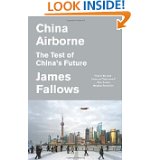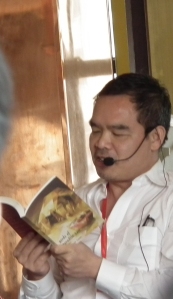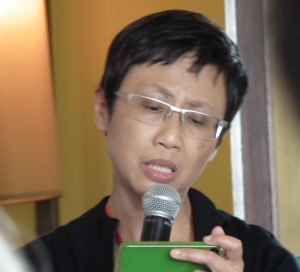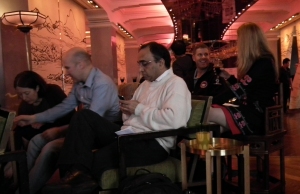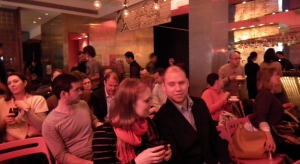2013 Shanghai Literary Festival: Authors, Photojournalists, and More


View from the 6th floor Glamour Bar toward the Bund and the Huangpu River.
I’m alone here in Shanghai. Well, I’m not really alone since 24,000,000 other people live in this vibrant city, but Barry isn’t here yet. So I was particularly pleased that my arrival on March 2, coincided with the annual Shanghai Literary Festival that features, from March 1-17 this year, 70 authors from 21 countries! I love it; that’s where I’ve been. Of course, I didn’t see all the authors, but I’ll share my experience, and you too are likely to add to your must-read list of books.
On Sunday, March 3, I attended my first session at the upscale M restaurant and Glamour Bar at #5 on the Bund to see Ryan Pyle, a photographer & T.V. producer, who traveled the border edges of China—18,000 km in 65 days—with his brother Colin on BMW F800G5 sports motorcycles! For those who care about such things, BMW R800G5’s power is 63.5 kW (85.2 hp) @ 8,000 rpm. These bikes took the extreme abuse, but the occasional need to get parts was an issue.

Ryan’s and Colin’ -BMW sports bikes– this model–only red. Photo from<http://en.wikipedia.org/wiki/BMW_F800S>
Before the Ryan and Colin started on their saga, they got off-road training at the BMW motorcycle factory in Germany.
Ryan shared photos and video clips and has written a book, The Middle Kingdom Ride, and produced a T.V. show as a result.
The G219 highway was the toughest stretch. According to Wikipedia, at 1,296 miles (2,086 kilometers) in length, G219 runs along China’s southwestern border from Yecheng in the Xinjiang Uyghur Autonomous Region to Lhatse in the Tibet Autonomous Region. Started in 1951, the road passes through the disputed area of Aksai Chin, which is administered by the People’s Republic of China but also claimed by India. The road’s construction was one of the triggers for the 1962 Sino-Indian War (from: <http://en.wikipedia.org/wiki/China_National_Highway_219>).
I don’t want to do such a trip by motorcycle, but it was fun for us to see Ryan and his brother mired in mud and other such adventures. His brother, Colin, had given up a good bank job and had never ridden a motorcycle before this feat–and he survived. Colin even joined for Ryan’s following challenge: riding the border of India. However, that experience was even worse, so Colin is back at a desk job.
One memorable detail from the Chinese border, Ryan said was when he was in Ji’an, a middle-size Chinese city with all its high rises and lights and fierce traffic, he could see across the border into North Korea. At night, Ryan could see no building lights, no smoke of rising heat, no headlights of vehicles–just darkness in North Korea.
Amazon gives The Middle Kingdom Ride 5 stars: <http://www.amazon.com/s/ref=nb_sb_noss_1?url=search-alias%3Dstripbooks&field-keywords=Ryan+Pyle>

Ryan Pyle – photo from <http://www.m-restaurantgroup.com/mbund/writers.html>
I’m interested in his India adventure too and will watch for its publication.
The next session I attended was for a poet from Texas; Shelly Bryant has lived in Shanghai and Singapore for 20 years! She plays with ideas and forms such as poems in three columns that read across or down or one that takes a word like “monster” and develops the poem from the synonyms. Very interesting—and good. Because the talk was held at 3pm on Wednesday, only 10 of us attended including three people from Shelly’s writing group and her Chinese translator, plus a newly retired Canadian who was a waste water engineer in Malaysia and the Philippines, a student from New Zealand who wants to connect me with her just arrived mother, and the girl’s Chinese friend. We had coffee/tea and desserts as we sat around a table with the sun pouring in the windows of this high-end restaurant on the Bund: delightful!

Poet Shelly Bryant photo from <http://www.m-restaurantgroup.com/mbund/writers.html>
You can reach poet Shelly Bryant to get her books and translations at www.shellybryant.com.
Next, I saw A.D. Miller author of Snowdrops: “a chilling story of love and moral decay.” Set in Moscow, it’s about how an ordinary person, in this case an ex-pat (and some of them do things in foreign countries that they would never do at home), can easily slide into darkness. The title refers to the all too common practice in Moscow of the Mafia dropping bodies into the winter snow; those bodies then don’t show up until spring as the snow melts.
A.D. talked about contradictions and the dark side of Moscow; he says corruption in Russia and Ukraine is pervasive. For the government there, “T.V. is the neuralgic point”; they don’t want the extent of the corruption known. Now in the Russian state of Georgia, however, people cannot bribe traffic police. Miller thinks the long-term outlook for Russia and Ukraine is good.
Amazon gives four stars to Snowdrops, shortlisted for a Man Booker Prize and several other awards and noted as one of the best debut books of 2011: <http://www.amazon.com/Snowdrops-A-D-Miller/dp/0307739473/ref=sr_1_1?>ie=UTF8&qid=1363839929&sr=8-1&keywords=A.D.+Miller>
Miller was stationed in Moscow as the correspondent for The Economist.

A.D. Miller – photo from<http://www.m-restaurantgroup.com/mbund/writers.html>
Another author, Michael Vatikiotis spoke on Indonesia and the Far East; he has lived in Asia for almost 30 years, much of that time as a journalist in Thailand and Hong Kong. He has many insights into the changes of Asia; he witnessed the end of the 1990’s, a time of clashes of values and of traditions.
Vatikiotis talked about how it’s generally ignored that in 1965-1966 a million or million-and-a-half people were massacred in Indonesia because they were Communists or thought to be Communist sympathizers. Just published in February 2013, Vitikiotis’ newest novel, Painter of Lost Souls, set in central Java, his favorite part of Indonesia, explores the religious and political tensions that have resulted in modern Indonesian society where Communism is still illegal and now 90% of Indonesia’s businesses (although only 10% of the population) are of Chinese ancestry and targets of violence. These Indonesian Chinese are sending their children to schools in China so they will learn their “mother” tongue. Several of the students I’ve met in my guesthouse are just such ethnic Chinese Indonesians.
Vitikiotis also talked about his transition from a journalist, when the magazine closed in 2004, to a fiction writer. He joined an on-line group Dim Sum, where people post short stories and members comment. He got encouragement to continue–and he has.

Michael Vatikiotis – photo from <http://michaelvatikiotis.com/>
Vatikiotis’ The Spice Garden gets 4 1/2 stars from Amazon and is only $4.99 for the Kindle edition. <http://www.amazon.com/s/ref=nb_sb_noss?url=search-alias%3Daps&field-keywords=Michael+Vatikiotis>
The next session featured author Tom Rachman. His novel The Imperfectionists spent 28 weeks on the NY Times best sellers list! Rachman talked about his writing path and process. He earned a Masters in Journalism at Columbia, but as he reached 30, he knew he wanted to be a fiction writer, not a journalist. So he quit his job and moved to Paris. He had enough money to write for a year. What he produced was a bomb–not even his mother liked it.
But now, he says that year of writing was a valuable tool. He learned that he wasn’t a naturally gifted writer, but that he could work, work, and revise, revise. He says that 90% of what he does is revision.
The Imperfectionists, Amazon says, is “One of most acclaimed books of the year. Tom Rachman’s debut novel follows the topsy-turvy private lives of the reporters and editors of an English-language newspaper in Rome.” Festival attendees commented on the novel’s tight construction and true-to-life characters.
Rahul Bhattacharaua was next. He started his career as a cricket player, a journalist who followed cricket games, and then when Cricket, the magazine where he worked folded, he went to Guyana for a year–just because he had liked it when he had been there for cricket matches. He wrote The Sly Company of People Who Care, a winner of the Hindu Literary Prize for Best Fiction in 2011 and other awards.
Rahul loves the music of the Guyana streets and the complex interaction of peoples whose ancestors arrived through forced immigration from China, India, and Africa. Now the Guyanan population is 43.5% Indian, 30.2% African, 16% Portuguese, .o2% White, and .019 Chinese. Catching all the flavor of the people he met and the pidgin languages there, Bhattacharaua wrote this book six months after he left Guyana.

Rahul Battacharaya – photo from <http://www.m-restaurantgroup.com/mbund/writers-details.html?id=328>
A reviewer on Amazon says, The Sly Company of People Who Care is “a unique travel book of great originality, chock full of outlandish characters, trips to places the reader will not even have imagined, and risky adventures to the interior. Not a ‘novel’ by any definition that I have ever read, the resulting book offers new glimpses into a lesser known part of the world, vibrantly described by a narrator who is obviously a stand-in for the author” (from <http://www.amazon.com/review/R2L9P3O0CHIBHO/ref=cm_cr_pr_viewpnt#R2L9P3O0CHIBHO>).
Bhattacharaua’s next book Mirror of Beauty will be out in June.
Then I saw one of the most interesting of the festival speakers, James Fallows, a writer for The Atlantic magazine since the late 1970’s. He’s lived in Asia many of those years and has great insights. He contributes regularly to NPR, was a speech writer for Jimmy Carter, has earned many awards, and has written 10 books including Postcards from Tomorrow Square: Reports from China; Breaking the News: How the Media undermine American Democracy; and Blind into Baghdad: America’s War in Iraq. His newest book is China Airborne.
Fallows covered four topics: the stated topic: Can China Make It?”; plus The Current State of China in the World; the State of the U.S. ; and the Evolution of U.S. Views on China.
A quick Fallows’ summary: compared to Japan, many of the investments in China are open, not the head-to-head competition as in Japan, and it’s much easier to make Chinese friends than Japanese friends. China is a gigantic, unknowable in many ways, conflicting country. However, while China’s rise is notable, it is not reason for threat.
Fallows says to immerse yourself in China because it’s important and fun. The economic relationship is more complimentary than you might think, and the biggest threat of China to the world is environmental. Fallows says, “It is definitely worthwhile to work in China.”
As for the question, “Can China make it?” Fallows says that in the last 30 years, China has done something miraculous in bringing millions of people up. But the move from the Keynesian work of factories to that of creating their own areodynamic industry is a “marsh test.” The path ahead will be harder the next 20-30 years.
China does not have the advanced liberal society that encourages creativity. For instance, the Internet censorship makes being on-line much slower than necessary and is not a marker for the most talented people. Fallows thinks the effect is bigger than you might think. He says it’s a “Dick Cheney effect”–knock things down before a possible problem. In addition, the Chinese universities are not considered world-class and are not attracting global students. Chinese parents seek to send their children abroad.
Little is reported about China in the U.S. mainstream press. China wasn’t really an issue in the U.S. presidential race. Fallows said that even though Mitt included dealing with China in the first 20 things he would do, he didn’t mean it.
To the question, “Is America going to hell?” Fallows says that every stage of our country’s development there have been two thoughts: 1) We’re great, and 2)We’re falling a part. But he sees our university system as strong and immigration reform should happen soon. Plus everyone else’s problems are worse than ours. The tax rates and health care can be worked out.
However, the U.S. government has a losing ability to reform; it’s too rigid. The institutions of self-government are a problem because they can’t police themselves and evolve. Fallows says, however, the governance of the U.S. problem is “more interesting than horrible.”
In China, the environmental pollution is a big problem and the government is trying, but really China in a lot of ways is still a poor country. The reason international flights into the Pudong Airport near Shanghai are always a half hour late is because the Chinese military is in control of the airspace. They make the planes take circuitous routes. He said it’s like flying between Washington D.C. and N.Y. City but having to go by way of St. Louis.
If the Chinese government follows the Dick Cheney role of quashing potential problems before they could happen, China and the U.S. will lose. A China of Dick Cheneys will be a factory power but not a creative power. Fallows sees China as making uneven progress and that most U.S. politicians are not worried about China.
China Airborne: The Test of China’s Future, the paperback is on sale now for only $9.61. Go to <http://www.amazon.com/s/ref=nb_sb_noss?url=search-alias%3Dstripbooks&field-keywords=James+Fallows>
Chinese born Da Chen was the next speaker: “From Fujian to Wall Street to Random House: Journey of a Chinese American.” At 9, he saw his neighbors string up his landowning father by his thumbs. His father survived, but Da Chen knew he wanted to get out of China. In 1985, at the age of 23, Da came America.
A memorist, Da Chen wants to share what people still suffer. He says “Life is srtonger than anything coming our way.”
When he first came to the U.S. to go to school, Da had his flute, which he played for us, and the equivalent of $30.00, the limit the Chinese government at the time would allow to be taken out. A customer, a lawyer, at the Chinese restaurant where he worked in Nebraska encouraged Da to go to law school. Da applied and was accepted to Columbia University School of Law. On Da’s last day of work in the restaurant, the lawyer left a $40 tip, which was enough to pay for half of his airfare to the East Coast. Da says America is full of good people. After graduating, Da worked many years for Rothschilds, a Wall Street investment banking firm.
So she would know the past, Da began writing stories for his American born daughter. He now writes full time.
Although China allowed Da Chen to come into the country to be at the literary festival, his books were stopped at customs.
Amazon gives four stars to Colors of the Mountain. Da’s most recent book is My Last Empress. Go to – <http://www.amazon.com/Colors-Mountain-Da-Chen/dp/0385720602/ref=sr_1_1?s=books&ie=UTF8&qid=1364018169&sr=1-1&keywords=da+chen>
“Migration Nation” was the next panel. The focal question was how has immigration impacted these authors and their work?
At 11, Andrew Lam fled Vietnam with his family. Lam says that the Vietnamese are not an immigrant people. The Vietnamese word for “country” is water+field=rice field. Migration for him meant the English language, which changed him. Learning English gave him the way to be in the world. At home, he was required to speak Vietnamese, which does not have pronouns. When he spoke to or about his father, he needed to say, “Father,” not the equalizer “you” or “he” of English.
Amazon says about Lam’s newest book, “The thirteen stories in Birds of Paradise Lost shimmer with humor and pathos as they chronicle the anguish and joy and bravery of America’s newest Americans, the troubled lives of those who fled Vietnam and remade themselves in the San Francisco Bay Area. . . Birds of Paradise Lost is an emotional tour de force, intricately rendering the false starts and revelations in the struggle for integration, and in so doing, the human heart.” From <http://www.amazon.com/Birds-Paradise-Lost-Andrew-Lam/dp/1597092681/ref=sr_1_1?s=books&ie=UTF8&qid=1364016669&sr=1-1&keywords=andrew+lam>
Lam says that now Vietnam is a different country to explore. He has no emotional ties to the new Vietnam.
For Xu Xi, Hong Kong is part of her. Although she couldn’t wait to leave and has had property in upstate N.Y. and in New Zealand, Hong Kong is her home.
Amazon describes Xu Xi’s novel Habit of a Foreign Sky: “Somewhere between Hong Kong and New York, life does an abrupt shift for Gail Szeto, when her mother, her last family member, is killed in an accident. For Gail, a mixed-race, single mother who had buried her young son less than two years prior, all she has left is a hard-won career at a global investment bank. Life rapidly goes into free fall for this woman with a complicated past, who was once so sure of her direction in life, who can now see no clear future path. Shortlisted for the inaugural Man Asian Literary Prize, this novel offers a an international cast of characters in New York, Hong Kong and Shanghai.” The book gets five stars from Amazon. Go to <http://www.amazon.com/Habit-Foreign-Sky-Xu-Xi/dp/988189672X/ref=sr_1_1?s=books&ie=UTF8&qid=1364019599&sr=1-1&keywords=xu+xi>
In contrast HM Naqvi’s ancestors did migrate, staying no more than 300 years anywhere, and he has been on the move too.
Of his Homeboy, about three young Pakistani men in New York City, Publishers Weekly notes, “Naqvi’s fast-paced plot, foul-mouthed erudition and pitch-perfect dialogue make for a stellar debut.”
Amazon gives Homeboy, 4 1/2 stars.
Next, Charlotte Wood’s topic was “How Does Creativity Work?” A novel writer from Sydney, Wood is doing a Ph.D. with her focus on creativity. She wants to explore where writers get their ideas. The psychology of creativity has been researched for 50 years.
She got the feeling once at the end of writing her novel Animal People of what Mihaly Csikszentmihalyi describes as “flow” a deep and glorious feeling of ease, unquestioning flow, an elevated state. However, you can’t make flow happen and you can’t wait. Chuck Close says, “Inspiration is for amateurs; the rest of us show up and work.” There is no writer’s block, but writer’s laziness; the work ethic is important. “Visions come to prepared spirits.” Wood says she doesn’t leave her writing room each day until she has written 1,000 words. It’s also important for her to show up at the same time each day.
Wood notes that many creative people start writing early in the day, so the pathway from sleep is smooth since the subconscious has been working during the night. She says that every artist must dig and bring what he/she finds into the light. Getting to the heart is the challenge. If it’s easy, it’s probably not deep. Also you need to love your characters even the ones others will hate because you need to understand them. Wood has very flawed ordinary people as characters because they are interesting and bring conflict and drama to the story. Wood says writing is about investigating those parts of yourself. She often starts with a technical challenge such as in her Animal People, the story takes place in one day.
From the Allen and Dunwin homepage, “I read Charlotte Wood’s novel Animal People twice. I think it’s one of the best contemporary novels I have read. But I cannot review it. I tried a number of times and failed each time. I only recently realized why this is. I don’t want to review Animal People. I want to recommend it.”
For Wood’s books, go to <http://www.allenandunwin.com/default.aspx?page=94&book=9781742376851>.
Adventurer and photojournalist Nick Danziger’s topic “Beyond Forbidden Frontiers” gave an overview of 25 years of documenting in photos and film of the world’s most dispossessed. He’s photographed victims of war, mainly women and children like the ones in Sierra Leone who although pleading for death instead had both hands cut off by the marauding militia, of unarmed Iranian refugees fleeing war shot by Turkish soldiers, and orphaned children abandoned in a Kabul mental institution where the patients are chained to the floor.
In 1984 without visas, Danziger followed the ancient trade route by walking and local transport from Turkey to China. He set off with 800 pounds (about $1,000 U.S.), which lasted him 16 months. He passed tens of thousands of Afghans fleeing the Soviets. It took him six weeks to reach Pakistan. He crossed over a Chinese border not open since 1948 and spent eight months in remote areas of China with the Muslim Uighurs.

Because he couldn’t read Pashto, Nick thought the sign above the head of the mullah counseling the woman was an anti-American slogan. The sign actually was just directions to where to buy gas.
Of war, Danziger says 90% of the casualties are civilians. Afghanistan now has 15 centers for prosthetic devices. In 1996, the Taliban were at first welcomed, but now women and girls are not allowed to get medical attention. The men would rather allow a woman to die in childbirth than to be seen by a man. One hundred twenty-five children crowd into one classroom; chalk is rationed.
In India, a father has to decide whether he should use his money to eat and so be able to take his HIV antidote and survive to care for his children or to feed his children that day. In Sierra Leone, 260 amputees live together. Danziger has documented these tragedies and more. But now, he says, there is no money for photojournalists. He has a website, but most people don’t want to know.
As for the U.S. troops in Afghanistan, the people don’t want Westerners there, but all the women he’s met in Kabul and in the countryside say they feel deep gratitude for Western protection. They are afraid what will happen when the Westerners leave.

Nick Danziger – adventurer and photojournalist- photo from <http://www.m-restaurantgroup.com/mbund/writers.html>
To see more of Nick Danziger’s photos and buy his books, go to his homepage: <http://www.nickdanziger.com/index/home>.
The next session featured Qiu Xiaolong and Howard French: “Disappearing Shanghai.” In 2004, Howard French was studying Chinese eight hours a day and would walk around with his camera to recover. Much of his career a foreign correspondent, he headed The New York Times‘ Shanghai bureau. French had read Qiu Xiaolong’s When Red is Black and loved it. When French saw the Qiu Xiaolong was speaking at the Shanghai Literary Festival, he came to the session, and the two have become good friends.
Qiu is author of eight award-winning Inspector Chen detective novels set in Shanghai. The latest is The Enigma of China. Qiu grew up in a corner of the Shanghai French Concession. French’s photos reminded Qiu of his old way of life. They formed a collaboration that resulted in Disappearing Shanghai, with photos by French and poems by Qiu.
In looking at the photos, Qiu wrote from his life, from his heart. Qiu and French talked about their wonderful collaboration. French told about the importance of their friendship and the resulting growth in his work and his own development.
Some people wonder why French doesn’t photograph the architecture, why he is showing the “bad” side of living in Shanghai. But French said his was an exploration of a particular way of life, “an intimacy, a promiscuity of close contact and fluid exchange and tasting validation.” Those close relationships of helping each other, sharing meals, and growing up surrounded by caring adults are disappearing. To meet someone now, you need to schedule a week in advance to meet at a good restaurant. But Qiu doesn’t stay in his old Shanghai apartment now: no private restroom.
French’s photos were taken over many years. He developed relationships with many of the people.
“Are the people happy their neighborhoods are gone, and they have moved to modern housing?” The answer to that question is complex. Often on short notice (like two weeks) , residents must leave the homes and friends they have had all their lives. They are moved from central Shanghai to the outskirts of the city. French says in his observation, for those people 50+ , it is a very hard move. In fact, he thinks that the mortality rate is extremely high for those people since the old neighborhood residents are scattered to various areas. They lose their homes, their friends, their way of life. But for those under 50, they are ready and eager to move and to get the compensation money. It’s not just the structure of the neighborhood that changes, it’s the change in relationships of going from where you share everything to “material improvement.” In the modern places, everyone “shuts their door”; you don’t know your neighbors. As humans, French sees, we are gaining material wealth but losing human connections. The modern world doesn’t have the concern as in Bhutan for the National Happiness Index. Not long ago, everyone in China would say as greeting, “Have you eaten?” and then invite everyone in for a meal. The language is even changing, “Come with us–next week.”
Qiu read his poem: “Dance of People Square,” inspired by a French photo.
French who teaches journalism and photography at Columbia University Graduate School of Journalism was asked how he got such intimate photos. He said he had to learn: look for a potential group, then waste time, be bored until they are no longer alert to your presence. He’s good at wasting time and taking pictures of things he doesn’t want until he becomes a part of the background. It takes six or seven hours of taking photos to get three or four good photos, and he returns to the same places all the time. Have good shoes and be prepared to wait. He says it’s not the equipment or gear, good photographs require time and space. Get close–three or four feet away–anticipate and then shoot: just do it.
He says it’s not hard to romanticize these old neighborhoods. However, it comes to toilets vs. relationships. The short warning time keeps people from organizing protests. But the move creates deep depression especially among the older residents.
French’s new work is photographing Chinese who have moved to Sub-Sahara Africa. About one million Chinese have gone there permanently. Others have written about this change as though China is taking Africa from the West or as this is a win-win situation for China. But French wants to take another point of view and include voices of Africans and Chinese involved. French has lived both places and speaks Chinese. Watch for this new book.
French is worried about the more and more materialistic way of living. He thinks that maybe Churchill said, “We shape our environment and our environment shapes us.” French noted that any city benefits from variety. When it becomes all high rises, it’s not good.
This book gets five stars on Amazon. Go to: <http://www.amazon.com/s/ref=nb_sb_noss?url=search-alias%3Daps&field-keywords=%22Disappearing+Shanghai%22>
Qiu, who earned a Ph.D. in Comparative Literature at Washington University, is also a translator, critic, and academic. Look for the newest of Qiu’s much-loved Mr. Chen series: The Enigma of China. Go to <http://www.amazon.com/s/ref=nb_sb_noss_1?url=search-alias%3Daps&field-keywords=The+Enigma+of+China&rh=i%3Aaps%2Ck%3AThe+Enigma+of+China>
Festival attendees
The next session featured Jeet Thayil and his novel Narcopolis, about the 1970’s opium world of Bombay.
Thayil began by entertaining us with performance poetry from his book English: “How To Be a Toad–… a Leaf…a Horse…a Crow…and a Bandicoot, (a huge Bombay rat impossible to kill).
About Thayil’s novel, Narcopolis, HM noted that it’s full of opposites: the epigram is a verse from the Koran and the “infernal holy braid” of Muslim, Hindu, and Christian religions are a big part as well as the third gender and opiated sleep.
The book includes much violence. But if you have lived in Bombay, Thayil says, you have to develop a way to handle the horror and violence. Jeet grew up in Hong Kong, Bombay, and New York. He sees that in Shanghai “money is the river that flows through the city, and you must learn to swim.” He went to Bombay in 1978 for college. During his first week, he was introduced to opium. But opium was stopped in 1982 and most users replaced it with heroin (and most who did died in four or five years). Jeet said he could do nothing during those years because his focus was on getting money and sourcing the heroin.
He knows heroin can be stopped, but too many people make money from it. In Bangalore, after the son of a police chief died of an overdose, overnight heroin sales shut down. The Taliban stopped poppy cultivation in Afghanistan, but in the last five years, its cultivation has grown exponentially.
Jeet started writing about 10 years after he cleaned up. But it took him 20+ attempts at quitting and rehabilitation (two quite different efforts he says). Finally, with the help of a methadone program in New York, he’s been successful. Now he feels he must write 300 words a day or he’s worthless.
A person in the audience asked, “How much do you think there is profound experience to opiates?” Jeet noted, “Morphine, opium, or heroin gives you a sense of when you were in your mother’s womb, an enveloping sense of love, of needing nothing. It kills pains and annihilates the sense of time. There is no question of happiness.” But while he was on it, he couldn’t share is insights.
He says it takes five years to recreate endorphins, so when he quit opiates, he was miserable for five years. Jeet’s poetry has been influence by opium; it slows everything down. Using rhythm and meter slows time. It messes with your ideas of linear time.
In Narcopolis, Dimple, the eunuch, is the moral center of the book. She shows that it is possible to be surrounded by squalor and horror and still be open to joy and beauty.
To have a view of life in India you may never see, go to <http://www.amazon.com/s/ref=nb_sb_ss_i_1_10?url=search-alias%3Daps&field-keywords=narcopolis+by+jeet+thayil&sprefix=Narcopolis%2Caps%2C852&rh=i%3Aaps%2Ck%3Anarcopolis+by+jeet+thayil>

Is Capitalism Broken? On the left, John Authers and Gideon Rachman debated that Capitalism is alive. Moderator David Piling in center. On the right, Henny Sender & Jesper Koll argued that it is broken.
The 2013 Shanghai Literary Festival ended with a debate among Financial Times journalists: “Is Capitalism Broken?”
Evidence that Capitalism is broken argued by Jasper Koll and Henny Sender include:
– 60% of the recent growth in the U.S. is of massive government intervention.
– There’s an illusion of growth, not sustainable, not self- correcting growth.
-They asked, “If young Americans need 2/3 of their lifetime income to save Capitalism, who benefits?
– In Alabama at the Hyundai parts plant, they had to throw out the written manuals for the machines and replace them with ones using pictures because so many of the employees could not read. Such an example shows how the U.S. infrastructure of public schools has been undermined.
– Only 9% of students from the bottom 20% income are in U.S. universities–not a democracy. Even the old formula: go to school and you’ll get a good job is not working for many.
–Capitalism should be about opportunity.
–Capitalism as it is now working does not hold people accountable. In fact, those who seem to benefit got us into trouble in the first place.
–Before 2008, the difference in pay between the CEO and a worker was 230%; now the difference is 258%.
–28 million are unemployed in the U.S. and we have a record prison population.
–Capitalism should be about the opportunity to win — and lose–wealth. The loss isn’t being allowed. City Bank has been bailed out three times.
–In China now 10% of the people have 86.7% of all assets
-In U.S., from 2000-2007, the top 1% got 65% of the gains, but from 2009-2012, the top 1% got 93% of all gains!
Their conclusion is that Capitalism is broken.
Reasons given by John Authers and Guideon Rachman for why Capitalism is not broken include:
– Capitalism needs to be judged by results, and it does create wealth.
-The question of inequality is a red herring; Capitalism shouldn’t be judged by equality.
– Capitalism is the opportunity to gain wealth: Since 1980, the GDP has tripled; the GDP in emerging markets has quadrupled. This year the emerging markets will surpass the developed countries.
– But change is a slow and painful process with children bearing debt, but Capitalism is cyclical and will survive. It’s moving in the right direction.
– Capitalism is prone to boom and bust, but it’s superior to all the other models.
– The 2008-2012 period involved crashes, but reforms are coming out of it, and Capitalism will emerge with new strength.
Moderator David Piling summed up the view that Capitalism is not broken by saying, “The fields are full of rice and the rivers are full of pigs.”
And then the vote:
The vote at the end was that Capitalism is not broken, but neither the four panelists, the moderator, nor the audience brought up any real question of is Capitalism basically moral or is it sustainable with its use of resources, and what about Global Warming …. this was pointed out by my 38-year-old seat mate, a German guy from Homburg who lived in Berlin for several years but has now been in Shanghai teaching German. He told me about a documentary he saw recently about Lake Victoria in Tanzania that now has only one kind of fish. After it was accidentally introduced, the non-native fish has killed all the other kinds of fish. The lake has been bought up by companies that catch the fish, flash freeze them, and send them out on Russian transport planes. The people who live around the lake are not allowed to fish; they are starving and only get the offal to pick through.
Last Monday, I told my students, who are all economics majors, the fish story and then about the “Is Capitalism Broken?” debate and how no one brought up the environment, Global Warming, sustainability, the growing inequalities around the world, or what a mess things are in for many people. Then I had them debate: “Does it matter how you make money?” In the first class, four of the 24 students argued it didn’t really matter. In the second class, only one said it didn’t matter–“because you could steal from the rich and give the money to the poor.” But almost all of them brought up the need to assess the long-term consequences like the pollution in Beijing–and the pigs in the river (which one person saw as an opportunity to create a waste management business). Overall, their reactions give me hope for Capitalism.
Besides the ideas and the books another reason to attend the Shanghai Literary Festival is to meet others. I met many people including a woman from Romania has lived in Shanghai for eight years. She is a textile designer who first worked here for Victoria Secrets and now Walmart. Another woman is a hotel designer.
Lots of writers and even more readers attended. Students interested in drama, wives from Germany, U.K., India, . . . coming to Shanghai with their businessmen husbands, a psychologist from India, a German from Berlin teaching German, English teachers, factory managers, embassy personnel, and travelers of all sorts; the festival draws many interesting people.
And, I hope to be back in Shanghai next year at this time for the 2014 Shanghai Literary Festival. I hope you will come too. In the meantime, we have lots of books to read.
You can see the official biographies of all the writers who presented at the Shanghai Literary Festival by going to <http://www.m-restaurantgroup.com/mbund/writers.html>
I’m looking forward to the 2014 Shanghai Literary Festival and hope to see you’re there. Right now, I’m off to read a good book.
Zài Jiàn, Renée
-photos not attributed are by me.



